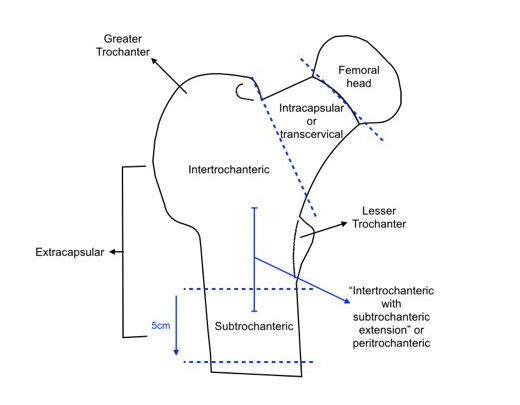Hip Fractures: Intracapsular Neck of Femur Fractures
Definition of an intracapsular neck of femur fracture (#NOF)
- Intracapsular neck of femur fractures (#NOF) occur within the capsule of the hip joint
- The blood supply to femoral head travels in a retrograde direction via the capsule. As such, any fracture within the capsule could be likely to damage this blood supply (see below, complications)
Epidemiology of intracapsular neck of femur fractures
- The classic patient is an elderly female with a low body mass index
- This is an example of an insufficiency fracture and therefore most likely to occur in those with other comorbidities
- In young patients this is more often the result of high energy trauma such as road traffic accidents or falls from a height.
- As such ATLS principles and investigation for coexisting injury must occur in these patients
Risk factors for neck of femur fractures
- The commonest cause in the elderly is generally a fall onto the side of the fracture
- The primary risk factors is osteoporosis but also other age-related issues which might make a frail patient likely to fall (i.e. poor vision, poor proprioception, arthritis, dementia)
Presentation of neck of femur fractures
- Fall followed by pain in the groin with referred pain to the thigh
- Limited ability to weight bear
- Limited range of movement (particularly straight leg raise)
- External rotation with shortening of the limb length in displaced fractures
Differential diagnosis of intracapsular neck of femur fractures
- Extracapsular neck of femur fractures
- Severe osteoarthritis of the hip/fracture osteophytes
- Femoral shaft fractures
- Acetabular/pelvic fractures (including pubic symphysis fractures)
- Septic arthritis of the hip
- Radicular pain from spinal pathology
- Psoas abscess
Classification of intracapsular neck of femur fractures
- The most common classification is the Garden classification:
- Garden I: incomplete and undisplaced fracture
- Garden II: Complete but undisplaced fracture
- Garden III: Complete fracture with partial displacement
- Garden IV: Complete fracture with 100% displacement
Initial management of intracapsular neck of femur fractures
- ABC approach
- Bloods, including clotting and G&S
- Fluids +/- RBC if shocked (a lot of blood can be lost into the hip following fracture)
- AP and lateral radiographs of the pelvis and affected hip
- Full length femur radiographs should be obtained if there is any suspicion of a pathological fracture (such as malignancy)
- Once fracture determined
- Po analgesia +/- a fascia iliaca block
- Discuss with the orthopaedic on call team
Further management of intracapsular neck of femur fractures
- This depends on the performance status of the patient as well as the displacement of the fracture
- Non-displaced fractures (Garden I+II)
- Relatively young patients (either chronologically or more important, physiologically) should have urgent internal fixation via 3 or 4 parallel partially threaded cancellous screws
- Displaced fractures (Garden III+IV), or even non-displaced fractures in the context of patients unlikely to tolerate non-weight bearing
- Replacement of the femoral head to obviate the risks of avascular necrosis (see below)
- This is most often via a hemiarthroplasty
- Younger, fitter patients are being offer a primary total hip replacement (THR) in centres able to provide the service
Complications following intracapsular neck of femur fractures
- General risks
- Anaesthetic risks
- Blood loss in theatre
- Venous thromboembolic disease
- Give anticoagulation +/- thromboembolic prevention stockings as per local protocol
- Internal fixation
- Avascular necrosis
- Mal-union or non-union of the fracture
- Infection of metalwork
· Hemiarthroplasty
- Dislocation of prosthesis
- Peri-prosthetic fractures
- Metalwork failure or acetabular erosion and consequent need for revision
Prognosis of intracapsular neck of femur fractures
- The presence of a hip fracture increase mortality for the first year
- After this period and levels return back to near normal
Click here for medical student OSCE and PACES questions about Hip Fractures: Intracapsular Neck of Femur Fractures
Common Hip Fractures: Intracapsular Neck of Femur Fractures exam questions for medical students, finals, OSCEs and MRCP PACES
Click here to download free teaching notes on Hip Fractures (#NOF): Intrcapsular Neck of Femur Fractures
Perfect revision for medical students, finals, OSCEs and MRCP PACES





